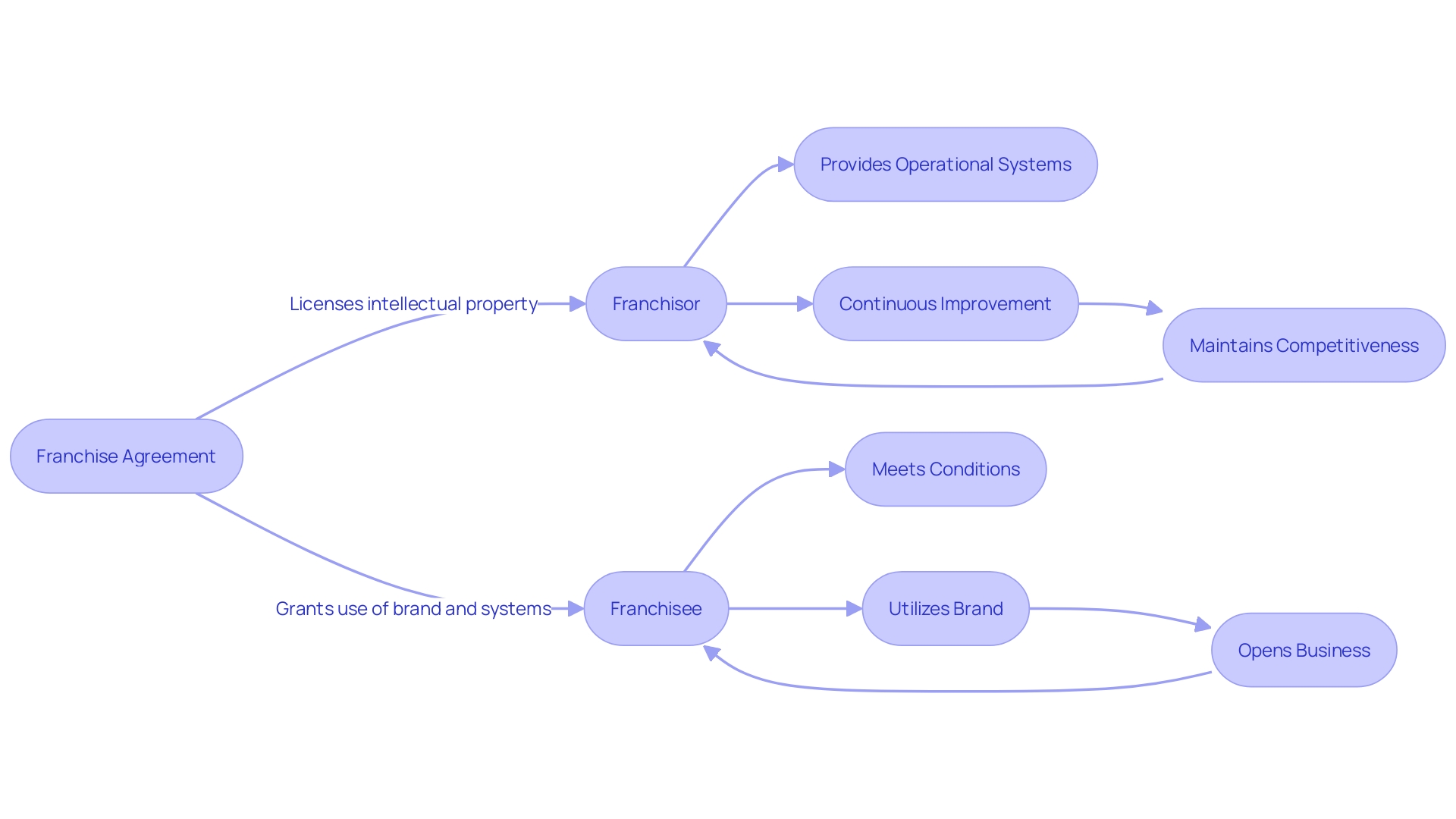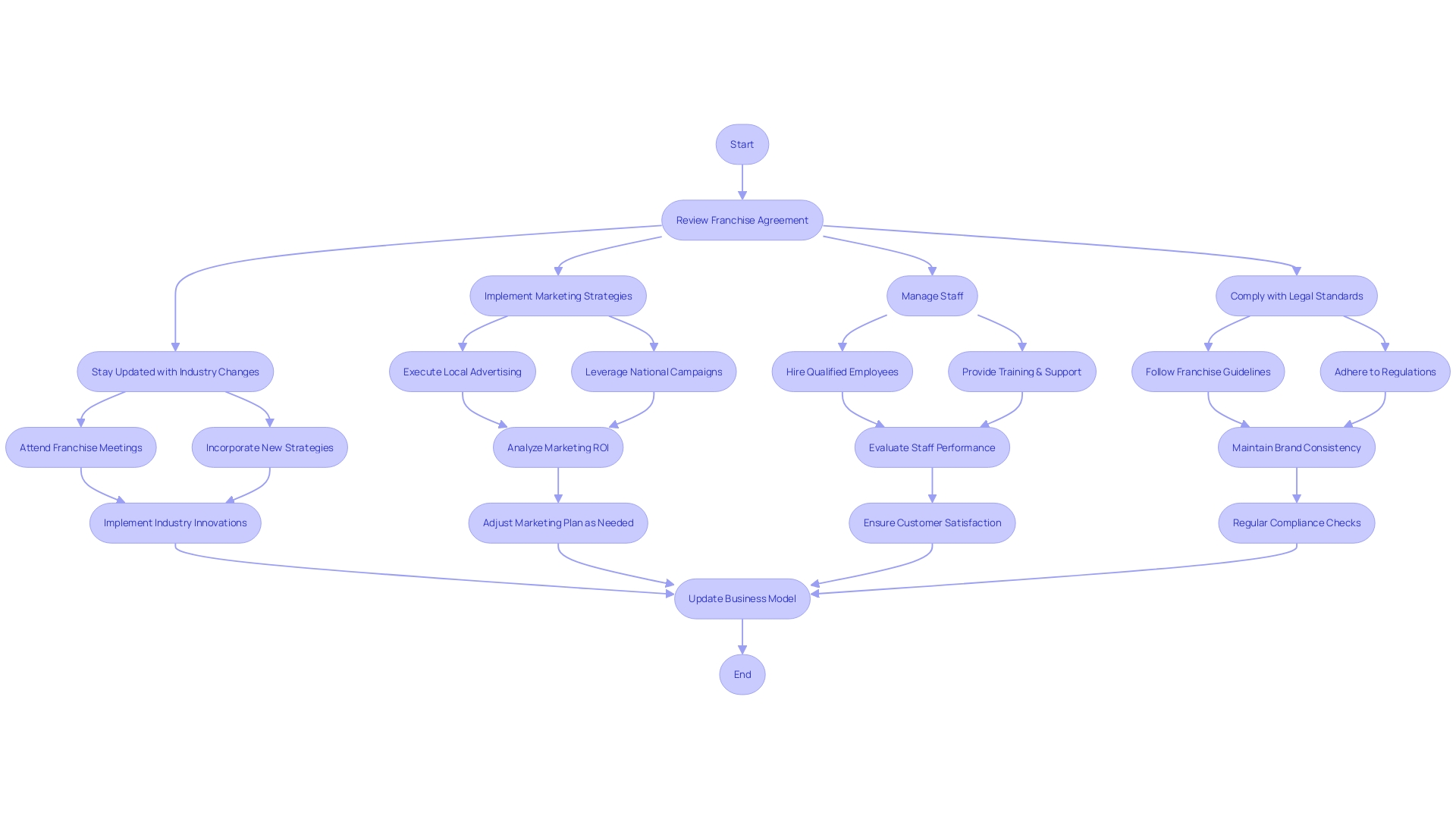Introduction
Franchising can be an exciting and profitable venture, but it comes with its own set of challenges. Whether you’re considering becoming a franchisee or a franchisor, understanding the roles, responsibilities, and financial aspects of the franchise model is essential for success. In this article, we will explore the definition of franchisee and franchisor, the key differences between them, and the importance of collaboration and support in the franchising relationship.
We will also delve into the financial aspects of franchising, the legal framework of franchise agreements, and the benefits and risks for both parties involved. Additionally, we will discuss market trends and future prospects in the franchise industry, providing valuable insights for aspiring franchise owners. So, if you’re ready to embark on a franchise journey or simply want to expand your knowledge in this field, keep reading for practical advice and guidance that will help you navigate the world of franchising.
Definition of Franchisee
Starting a franchise venture entails entering into a franchise agreement, which acts as the legal foundation of the partnership between a franchising company and a franchisee. This agreement is basically a license that gives the franchisee the right to operate under the trademark of the company, utilize their business systems, and benefit from their brand recognition. The franchisee is generally obligated to make an initial investment fee along with ongoing royalties in return for these privileges as well as continuous support from the party granting the franchise.
Understanding the franchise agreement is critical as it delineates the responsibilities and protections for both parties involved. It includes conditions that must be met by the franchisee, safeguarding their investment and ensuring adherence to the company’s established standards of operation.
Franchise systems are designed to maximize efficiency and profitability. By leveraging established business models and operating procedures, franchisees can often achieve greater success than they might independently. The franchisor’s proven systems are meant to streamline operations, minimize waste, and enhance overall efficiency, contributing to the potential profitability of the enterprise.
When considering business opportunities, it’s crucial to evaluate different factors such as startup costs, potential earnings, and market viability. This involves a detailed examination of the disclosure document, which provides insights into average revenues and profit margins, as well as an analysis of local market conditions, competition, and consumer preferences.
In the midst of the constantly changing landscape of business opportunities, forward-thinking concepts such as mobile oil change services, as exemplified by Luby Dudes and Spiffy Green, showcase the industry’s movement towards convenience and specialization. These systems capitalize on streamlined services and efficient waste management processes to meet the needs of today’s consumer market.
It’s important to note that the sector of business ownership is not without its challenges, as evidenced by the recent legal troubles of Boston Market. Nonetheless, the success stories of towns like Frankenmuth, Michigan, where two of the largest independent restaurants thrive, showcase the potential rewards of a well-executed franchise strategy.
Definition of Franchisor
The franchising world operates on a foundation of shared success between franchisors and franchisees. An entity is not merely a company that provides the rights to operate a business under its brand; it is the caretaker of the business concept, the protector of trademarks, and the creator of the intellectual property that distinguishes that brand. This entity provides a comprehensive package to the franchise that includes training, support, and the guidance needed for the franchisee to thrive. At the heart of this is the agreement for the business model, a vital legal document that outlines the permissions granted by the business owner to the business partner, including the use of the owner’s intellectual property, systems, and brand identity.
The path to success for a franchisee is directed by adherence to the established model of the franchising company, which is why the franchise agreement is so pivotal. It’s a strategic blueprint for operating the business and includes crucial information on litigation history, bankruptcy records, and initial investment estimates. Trademark and intellectual property rights are also detailed within this agreement, allowing the franchisee to leverage the franchisor’s brand and systems without legal infringement.
In recent developments, the industry of owning and operating a franchise has experienced a significant rise in businesses owned by women. Over the past decade, there has been a 24% rise in female ownership of business opportunities, with women launching 41% of new business opportunities in the last two years. These entrepreneurs are drawn to franchising for the structured framework it offers, enabling them to launch and operate a business with considerably lower financial risk compared to starting from scratch. Franchise Business Review’s evaluation criteria—ranging from passion alignment to financial viability—reflect the diverse factors contributing to a business’s success.
In the midst of the competitive landscape, the business model remains a beacon for those seeking entrepreneurship. It offers an appealing mix of reduced risk, manageable investment, and an established market presence. The package for a franchised opportunity typically encompasses vital support and advice, making it a less daunting venture into ownership. The accomplishments and anecdotes shared in the BFA Magazine and the extensive number of enterprises supporting millions of jobs emphasize the sector’s liveliness and the possibilities it offers for aspiring entrepreneurs.
Key Differences Between Franchisee and Franchisor
The franchise model is a powerful way to operate, and comprehending the distinct roles within this model is crucial. The granting authority is the one giving the right to use their brand and operational systems. The intellectual property, expertise, and established brand are what the franchisee utilizes to conduct business. On the other side, a franchisee is the entrepreneur who invests in and operates a single or multiple franchise units. They follow the blueprint provided by the company that grants the franchise, which often includes a comprehensive operational manual and ongoing support.
Franchise agreements are the cornerstone of this relationship, clearly defining the rights and responsibilities of both parties. These agreements ensure the franchisee can utilize the franchisor’s trademarks, service marks, and proprietary systems under specified conditions, safeguarding the franchisor’s brand integrity while providing the franchisee with a proven model.
In the context of market trends, the role of franchisors as system innovators becomes apparent. They continuously improve their business models and provide updates to their associates, maintaining competitiveness across the industry. According to the International Franchise Association, franchising plays a significant role in the U.S. economy, supporting millions of jobs and contributing significantly to the GDP.
Considering the financial investment involved, potential business owners must assess various aspects before committing. This includes evaluating startup costs, potential earnings, and local market conditions. The recent strategic investment by Burger King in marketing and remodels highlights the importance of staying relevant and adapting to market challenges, as seen with their franchisees facing difficulties post-pandemic.
In summary, the franchisor-franchisee dynamic is a partnership where both roles are interconnected, each playing a critical part in the success of the system. With a clear agreement in place and a comprehensive understanding of the market, this relationship can lead to mutual profitability and growth.

Roles and Responsibilities of a Franchisee
As a franchisee, your role extends beyond simply managing an enterprise; it is about adhering to a proven system with defined brand standards, while contributing to the overall value of the brand. This involves implementing effective marketing strategies, overseeing day-to-day operations, and providing outstanding customer service. To succeed in these fields, it’s essential to cultivate strong relationships with customers, as their satisfaction is the foundation of your business’s success.
Your responsibilities also encompass the recruitment, training, and management of your staff to ensure they uphold the brand’s values. Moreover, managing inventory and complying with both legal and regulatory standards are key facets of your role. As you navigate the complexities of the agreement—a legal document granting you the right to operate under the franchisor’s name and system—it’s crucial to understand the importance of the franchisor’s intellectual property, which forms the foundation of your business.
Keeping up to date with changes in the industry, such as shifts in royalty fees or technological advancements, is crucial. For instance, with major brands like McDonald’s adjusting their royalty structures, it is clear that the economic landscape for franchisees is constantly evolving. The International Franchise Association (IFA), championing the concept of franchising since 1960, is a resource for education and advocacy, aiding your growth and facilitating connections within the franchise community.
Ultimately, embracing the complete extent of your role and maintaining awareness of market trends will position your opportunity for expansion and durability in a dynamic commercial settings

Roles and Responsibilities of a Franchisor
Franchisors are the foundation of the business model, controlling the brand’s growth and achievement. Important duties of the entity granting licenses include giving permissions to qualified individuals, enabling them to utilize the established brand, intellectual property, and operational systems of the entity. This licensing is enshrined in the all-important franchise agreement, which dictates the terms of use for the entity granting the license’s trademarks, service marks, logos, and other branding elements. In return, individuals who enter into a franchise agreement agree to uphold the standards and meet the conditions set forth by the franchisor.
Moreover, franchisors provide a spectrum of support services encompassing training programs, marketing strategies, and continuous operational backing to ensure that franchisees are well-equipped to meet business challenges and maintain service quality. This support is crucial in safeguarding the reputation of the business and ensuring a uniform customer experience across all locations.
Enforcing quality standards is a franchisor’s duty to maintain brand integrity. This involves monitoring adherence to laws and regulations related to franchising, which vary by jurisdiction, as seen in the case of Marco’s Pizza® where sales under the agreement are subject to specific state regulations. Such attention to legal compliance is vital to the ability of the business to operate without hindrance.
In the evolving franchise landscape, growth opportunities are not limited to domestic markets. Brands like Marco’s Pizza® highlight their mid-year expansion and the potential for both domestic and international multi-unit ownership, demonstrating the vast opportunities for potential owners.
Franchisors are therefore not just licensors but partners and mentors to their franchisees, instilling a culture that prioritizes both product excellence and a people-first approach. The combined knowledge within the franchising community, represented by organizations such as the International Franchise Association (IFA), emphasizes this dedication to education, advocacy, and the ongoing progress of franchising as a model. Such a community-driven approach is a testament to the shared goal of nurturing growth and ensuring the success of each franchise unit.
Financial Aspects: Fees, Royalties, and Investments
The financial relationship in franchising is a cornerstone of the model, involving numerous monetary commitments. Franchisors charge an initial fee giving individuals the opportunity to utilize their brand and operating systems. In addition to this, franchisees must remit ongoing royalties, a slice of their revenue, to support the network’s evolution and receive ongoing assistance.
Franchisees need to be financially prepared for further expenditures, including equipment, inventory, and promotional expenses, all necessary to uphold brand standards and foster business growth. The agreement serves as the crucial legal document detailing these responsibilities, ensuring both parties understand the terms of the license to use the owner’s intellectual property and systems. It is this agreement that underpins the franchisee’s ability to operate under the franchisor’s name, abiding by the established criteria.
Joining a business partnership is a significant financial undertaking. It is crucial for prospective franchisees to carefully examine all associated costs and consider the extent of their investment. To navigate these financial waters, one might explore loans for business opportunities, which are offered by various lenders, and consider the amount to borrow and the loan terms, particularly if substantial equipment financing is needed.
In the wider market, it’s crucial to stay aware of economic conditions, like inflation and regional downturns, which can affect consumer behavior and have an impact on the industry. The success of franchising efforts is also dependent on the ability of the company offering the franchise to adapt and thrive amid industry challenges, including supply chain issues, labor costs, and global economic shifts. Aspiring business owners should meticulously evaluate these factors before proceeding with their investment to ensure a fortified financial strategy.
Legal Framework: Franchise Agreements and FDD
An agreement to operate a company under a brand and system is similar to a license, where the party granting the permission allows the other party to utilize its intellectual property. This legal document is pivotal, as it delineates the rights and responsibilities of both parties involved in the franchising relationship. For those who invest in a franchise, this agreement is a crucial protection for their financial commitment, as it allows them the privileges to establish and operate a business under the brand’s name, following specific requirements.
The Franchise Disclosure Document (FDD) supplements the agreement for business opportunities by offering potential investors with comprehensive information regarding the company’s operations. It encompasses the litigious and financial past of the company granting the business opportunity, along with initial investment projections, thereby providing prospective business owners with the essential data to make an informed choice. Intellectual property is a cornerstone of this agreement, allowing the franchisee to legally use the franchisor’s trademarks, service marks, logos, and proprietary systems.
Comprehending these documents is crucial, particularly in a rapidly changing business market. For instance, McDonald’s recent revision of royalty fees—from 4% to 5% for certain franchisees in the U.S. and Canada—signals the importance of staying informed about industry trends and financial implications. This adjustment aligns McDonald’s with the fees charged by many other restaurant chains and is indicative of potential shifts in the franchising model, influenced by industry regulations and technological advancements.
Franchisees must also be aware of their operational obligations, which can include scheduling, duty assignments, supervision, job responsibility definition, disciplinary actions, and hiring or terminating employees. These operational elements are often stipulated in the contractual agreement, thus emphasizing the significance of understanding the entire range of the business relationship before committing to this substantial business endeavor.
Benefits and Risks for Both Parties
Participating in a business opportunity can be a strategic decision for both individuals and companies, each gaining unique advantages while also encountering their own set of obstacles. Franchisees tap into the advantage of a recognized brand and benefit from established operational systems. This frequently results in a higher likelihood of profitability in contrast to initiating an autonomous endeavor, not to mention the instruction and assistance that accompany becoming part of a network. Nevertheless, individuals who enter into a franchising agreement must adhere to strict brand guidelines, embrace limited independence in certain operational choices, and meet continuous financial obligations to the franchisor.
On the other hand, franchisors witness their brand thrive as they hand it over to individuals who purchase the rights to operate under their brand, thereby generating extra income through fees and royalties. They utilize the local market knowledge and capital of franchisees to expand their operations. However, franchisors do face their own challenges; they need to invest in ongoing support, guarantee consistency of the brand among their branches, and prioritize the prosperity of their franchisees—as their achievement ultimately contributes to the franchisor’s success.
In today’s digitally-driven marketplace, franchising dynamics are evolving. Technological advancements have paved the way for more semi-absentee business models, where owners can manage their operations part-time, thanks to efficiency gains from tech tools. This marks a significant shift from the traditional owner-operator commitment, expanding the horizons for those who aspire to invest in franchises while balancing other commitments.
Before delving into the realm of franchising, potential individuals interested in starting a franchise are equipped with a Franchise Disclosure Document (FDD), which delineates the connection between the party granting the franchise and the individuals who are granted the franchise. It’s important for potential entrepreneurs to carry out comprehensive due diligence, comprehending the legal aspects such as the company’s litigation history, bankruptcy records, and the initial investment required. The FDD and franchise agreement are not merely formalities; they’re foundational documents that grant franchisees the right to use the franchisor’s intellectual property, systems, and brand, ensuring that the franchisee’s investment is protected.
Franchising is not just about embracing a prosperous model; it’s about becoming part of a system where the success of one feeds into the success of all. Aspiring entrepreneurs should carefully consider their level of desired control and involvement in the industry, as these factors will greatly influence their franchising journey and ultimate success.

Importance of Collaboration and Support
The core of a successful chain lies not just in the strength of its operational plan but also in the bond between franchisors and partners. This relationship is built on a foundation of open lines of communication, mutual respect, and a vested interest in the collective success of the brand. An agreement between the two parties forms the foundation of this partnership, providing a legal structure that gives individuals the permission to utilize the intellectual assets, systems, and brand of the organization, with the expectation that these individuals will maintain the brand’s quality and follow the established business model.
Franchisees are encouraged to be proactive in seeking support and guidance from their franchisors, taking full advantage of offered training programs, and utilizing the available resources to their fullest extent. It’s also crucial for individuals who possess franchises to stay informed about the franchisor’s litigation history, bankruptcy records, and initial investment estimates to make well-informed decisions.
From a different perspective, franchisors must keep in touch with their partners, offering ongoing assistance, education, and updates to the business model based on shared input and changing market patterns. With insights from the International Franchise Association, which represents the world’s oldest and largest group advocating for franchising, it’s clear that the franchising industry is a significant contributor to the economy, supporting millions of jobs and a considerable percentage of the GDP.
By maintaining a cooperative partnership, both business owners and franchisors can utilize the collective knowledge and experience within their network to adapt to market dynamics and consumer preferences, thus maximizing the business’s potential for success and growth. The business model of franchising demands commitment and adherence to a proven system, but it is precisely this very structure that can lead to remarkable achievements within the industry, as evidenced by the steady growth in franchise units year over year.
Market Trends and Future Prospects
For entrepreneurs looking to thrive in today’s franchising industry, awareness of emerging market trends and future prospects is crucial. The fast-paced nature of consumer preferences, technological breakthroughs, and evolving industry rules calls for a proactive stance. Franchisees, by staying attuned to these shifts, can customize their models to better satisfy the dynamic wants of their customers. This agility can translate into sustained patronage and growth.
Similarly, franchisors must find new opportunities for growth and innovation to maintain the vitality of their network. A keen understanding of market directions enables informed decision-making around investment, expansion, and long-term viability strategies.
Consider how Stora Enso, a leading paper manufacturer turned renewable materials company, pivoted its entire business model in response to prevailing market trends. They not only redefined their product line but also underwent a significant organizational transformation to align with the sustainable materials market demand.
In the sector of franchising, for example, fast food chains continue to be a strong proposition due to their convenience, affordability, and consistent quality. The health and wellness segment also shows promise, expanding rapidly with a focus on nutrition-conscious consumers. Meanwhile, emerging categories like beverages and meal prep services are carving out their niche, indicating a vibrant and diverse future for franchising.
The Franchise Disclosure Document (FDD) further underscores the importance of clear roles and due diligence in franchising, ensuring that potential franchisees are well-informed about their commitments.
A ‘customer-focused approach’ is essential for a successful business model. It’s about fostering relationships, excelling in service, and addressing customer needs promptly—factors that directly influence company success. Equally important is ‘business acumen,’ which goes beyond adhering to the franchise manual. It requires a profound comprehension of management, encompassing finances, marketing, and leadership.
Ultimately, a ‘strong work ethic‘ is indispensable. Successful franchisees demonstrate tenacity and willingness to invest time and effort, particularly during the initial stages of their venture. These components, combined with the assistance and education from the main office, establish the foundation of a prosperous business.
Observing high unit growth in certain industries, experts draw from over four decades of franchising experience to predict the sectors likely to excel. Categories like chicken, pets, and health and wellness continue to prosper, while newcomers such as beverage franchises and sports-related services suggest a diversifying landscape.
In conclusion, staying competitive in franchising demands a forward-thinking mindset, an eye for innovation, and a commitment to operational excellence, all while never losing sight of the customer’s evolving needs.
Conclusion
In conclusion, franchising offers a lucrative business opportunity for both franchisees and franchisors. The franchise agreement outlines the rights and responsibilities of each party, with franchisees benefiting from established business models and brand recognition, while franchisors expand their brand and revenue through capable franchisees.
Collaboration and support are vital in franchising. Franchisees should seek guidance and utilize training programs, while franchisors must provide ongoing support and updates to ensure brand integrity.
Financial aspects play a significant role, with franchisees needing to be prepared for initial fees, royalties, and additional expenses. Prospective franchisees should evaluate their financial strategy and consider franchise loans if needed.
Understanding the legal framework is crucial, with franchise agreements and the Franchise Disclosure Document (FDD) providing protection for both parties. Staying informed about industry trends is essential for adaptation and success.
Market trends and future prospects indicate a dynamic landscape. Franchisees should stay attuned to consumer preferences and technological advancements. Fast food franchises, health and wellness segments, and emerging categories show promise.
In summary, franchising offers a pathway to entrepreneurship with reduced risk and established support systems. By fostering collaboration, understanding financial aspects, complying with legal requirements, and staying informed about market trends, both franchisees and franchisors can achieve mutual profitability and growth. The franchising industry continues to evolve, presenting exciting opportunities for aspiring business owners willing to adapt to customer needs.
Learn more about the legal framework in franchising and how it can protect your interests.


